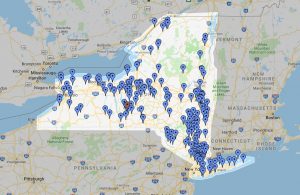How Can Your Community Become ‘Climate Smart?’

Becoming “climate smart” is catching on in communities across the globe. Here in New York State, municipalities of all sizes are taking the Climate Smart Communities pledge, and committing to taking steps – no matter how big or small – to reduce their footprint on the earth.
During the Jan. 15 Putnam Valley Town Board meeting, Europa McGovern, coordinator of the Climate Smart Communities Program of the Hudson Valley Regional Council, described ways the town can join the movement.
The CSC program, which is sponsored by the state Department of Environmental Conservation and the New York State Energy and Research Development Authority, began three years ago. It identifies 10 actions municipalities can commit to, to save money and energy.
“For bigger cities, maybe LED street light conversion can be beneficial; for smaller communities, maybe getting a fleet electric vehicle for your code enforcement officers,” explained McGovern.
She said there are 290 communities statewide that are participating in the program. “Basically it just starts with you passing the Climate Smart Community pledge,” she said. This symbolic gesture allows the municipality to get preferential scoring for grant awards.
“And you can stop there, you don’t have to do anything else,” explained McGovern. “But of course, what’s the benefit of that? That’s just a tiny step, just a drop in the bucket for hopefully what’s an infinite process.”
A community may take the commitment a step further and choose to submit actions and become certified “Climate Smart,” which will open up the door to even more grant opportunities. However, this is not such an easy task, as only 34 communities in New York State have achieved certification.
“That’s really hard word,” said McGovern.
Almost 90 communities in the mid-Hudson region have taken the pledge, including Putnam County and the Town of Philipstown, as well as the villages of Cold Spring and Nelsonville. In Dutchess County, the City of Beacon has applied for certification, as has the Town of Dover, which has gotten “a few pretty big grants” to complete greenhouse gas omissions inventory and other action plans over the past couple of years, said McGovern.
“There’s a lot of funding opportunities, a lot of resources,” she said.
Putnam Valley is already making “climate smart” steps, as the town recently completed a natural resources inventory, and converted all its street lights to LED. “There you go – you already have a major action done,” said McGovern.
“When you start looking through the actions, for communities that haven’t even adopted the pledge, you’ll actually find that you’ve probably completed five or 10 actions right off the bat because you found the cost benefits and the energy saving benefits that had nothing to do with this, but now they fit in under it,” she said.
Town Supervisor Sam Oliverio said the board will review the information McGovern presented and likely act quickly to adopt a resolution and pledge to officially become “climate smart.”
